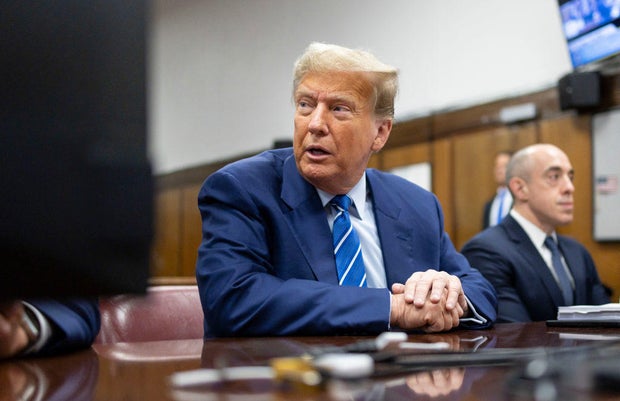Jury selection in former President Donald Trump’s historic criminal trial in New York is continuing for a second day on Tuesday with prosecutors and defense attorneys clashing over which potential jurors should be seated.
A dispute over one juror’s Facebook posts showing celebrations after Trump lost the 2020 election prompted audible comments from the former president. That earned him an admonishment from Judge Juan Merchan, who told Trump attorney Todd Blanche to speak to his client.
“Mr. Blanche, your client was audibly uttering something. He was audible, gesturing and speaking in the direction of the juror. I won’t tolerate that,” Merchan said. “I will not have any jurors intimidated in this courtroom. I want to make that crystal clear.”
Blanche had asked the judge to dismiss the juror over the video posts, which showed people cheering in the streets of New York. The woman told the court that she wanted to capture a “New York City celebratory moment,” likening the cheers to nightly celebrations for health care workers during the COVID-19 pandemic. She insisted she could remain impartial during the trial.
The judge did not dismiss her, saying she provided reasonable explanations for both posts. But he did excuse another man who had posted about Trump’s “unlawful travel ban” and wrote “get him out and lock him up.”
Day 2 of jury selection
Those disputes came after prosecutors and defense attorneys got their first chance to directly question potential jurors who made it past a first round of screening. Earlier, Joshua Steinglass, a member of Manhattan District Attorney Alvin Bragg’s office, told the jurors that the case “has nothing to do with your politics.”
“We don’t suggest you need to have been living under a rock for the last eight years, or the last 30 years,” he said. “We don’t expect you not to have heard about this, or not to have discussed this case with friends. What we do need is for you to keep an open mind.”
The first batch of potential jurors were sworn in on Monday after pretrial arguments over evidence and rules for the proceedings. Roughly two thirds of the group of 96 New Yorkers were quickly dismissed, with most of them saying they wouldn’t be able to be fair and impartial in the trial. Others were excused for various other reasons. The slow process of identifying suitable jurors is likely to last at least a week.
More jurors were sent home when Tuesday’s session got underway. One woman was dismissed with flu-like symptoms. Several more said they couldn’t be fair or impartial, including a man who moved to Manhattan from Texas and said he got his news from Fox News and Barstool Sports, among other sources. He said it was “going to be hard for me to be impartial,” since many of his family and friends growing up were Republicans. Merchan thanked him for his candor and excused him.
Prosecutors and defense attorneys may also briefly argue, without jurors present, over what topics the state can question Trump about if he chooses to testify in his own defense later in the trial.
The “hush money” case
Trump, the presumptive Republican nominee for president, is charged with 34 state felony counts of falsification of business records related to a “hush money” payment his attorney made to adult film star Stormy Daniels before the 2016 election. He has pleaded not guilty to all charges, claiming the prosecution is part of a plot by Democrats aimed at preventing him from retaking the White House. The case is the first of four criminal prosecutions against Trump to make it to trial.
Entering the courtroom on Tuesday, Trump called the trial a “sham” and said the charges should have been dismissed.
“This is a trial that should never happen. It should have been thrown out a long time ago,” he told reporters.
At several points during Monday morning’s pretrial arguments, Trump appeared to fall asleep at the defense table, his chin dropping to his chest briefly. In one instance, he was stirred awake by his attorney. He appeared to doze off at several points again on Tuesday.
The trial is expected to last between six and eight weeks, convening every weekday except Wednesdays, with some shortened days for the Passover holiday. The schedule severely limits Trump’s ability to hit the campaign trail, which he has cited to support his claims of political bias.
“I should be right now in Pennsylvania, in Florida, in many other states — North Carolina, Georgia — campaigning,” Trump said Tuesday.

